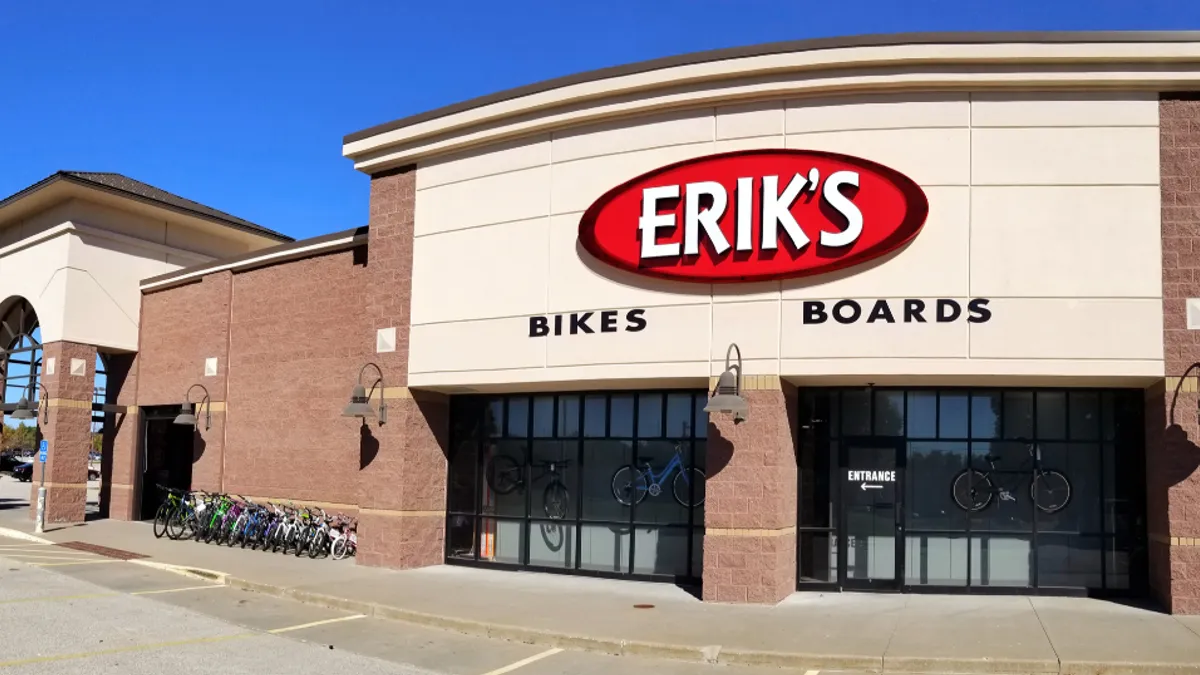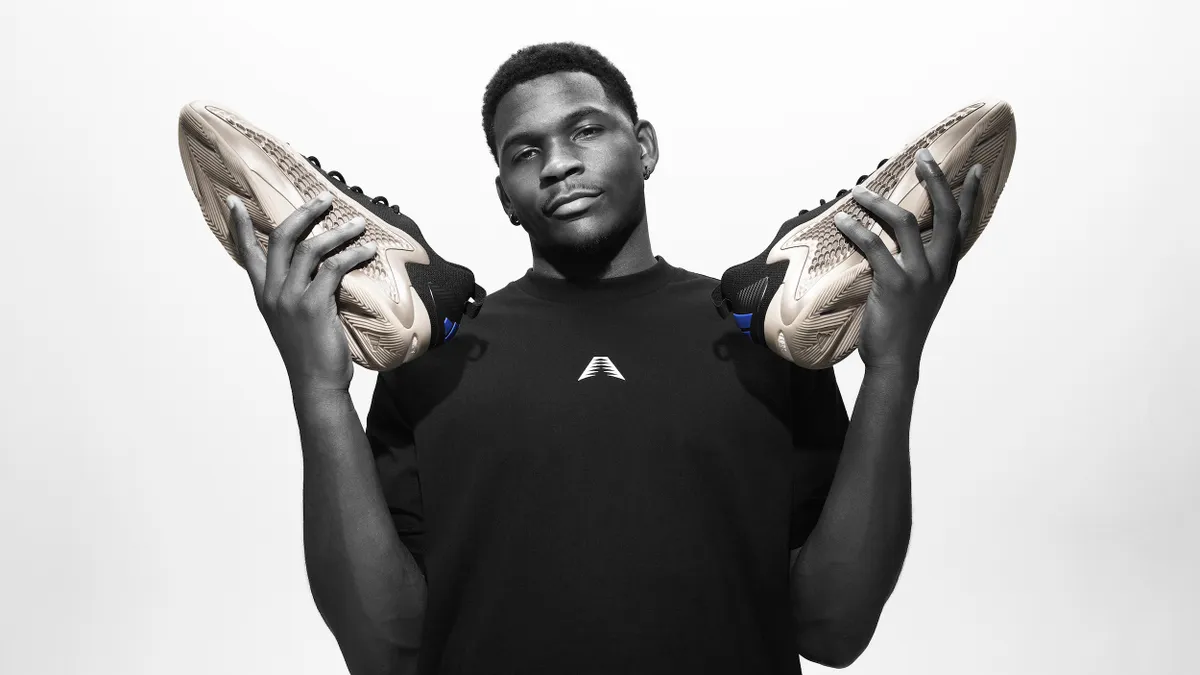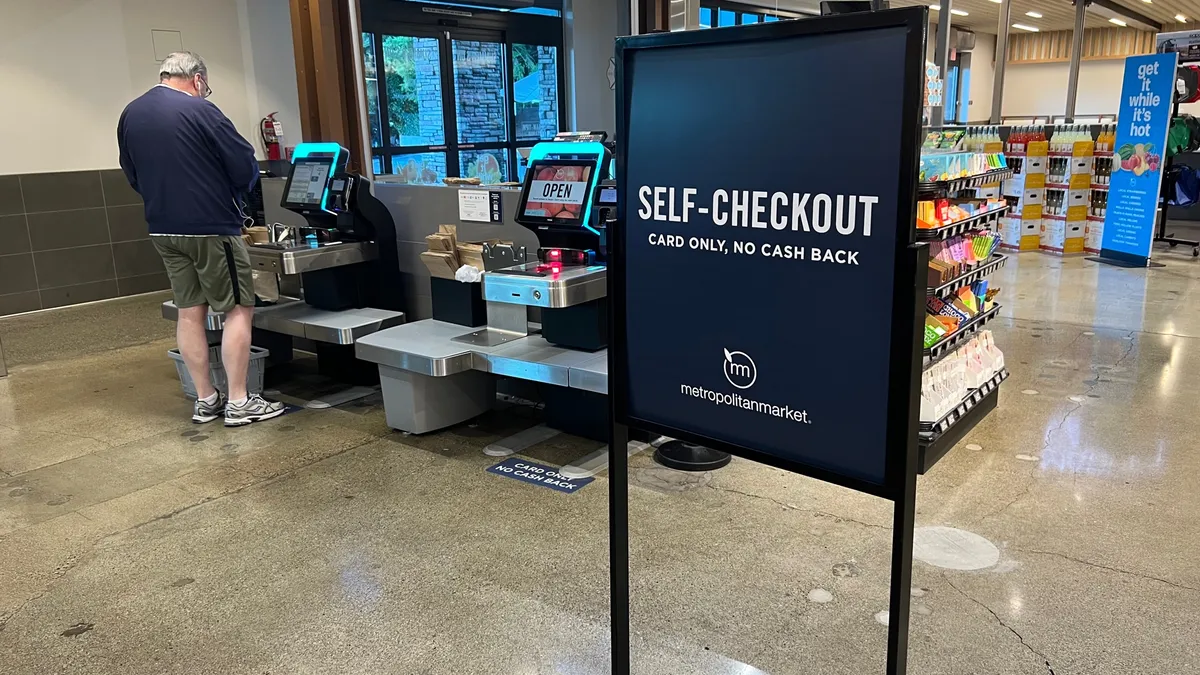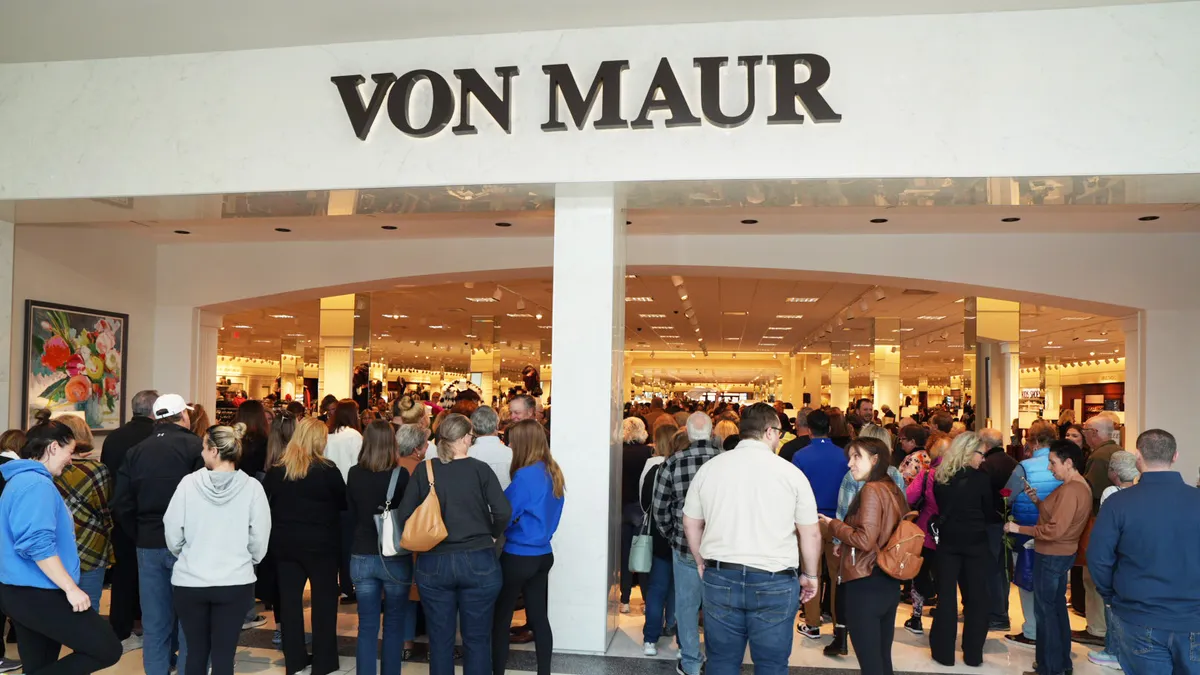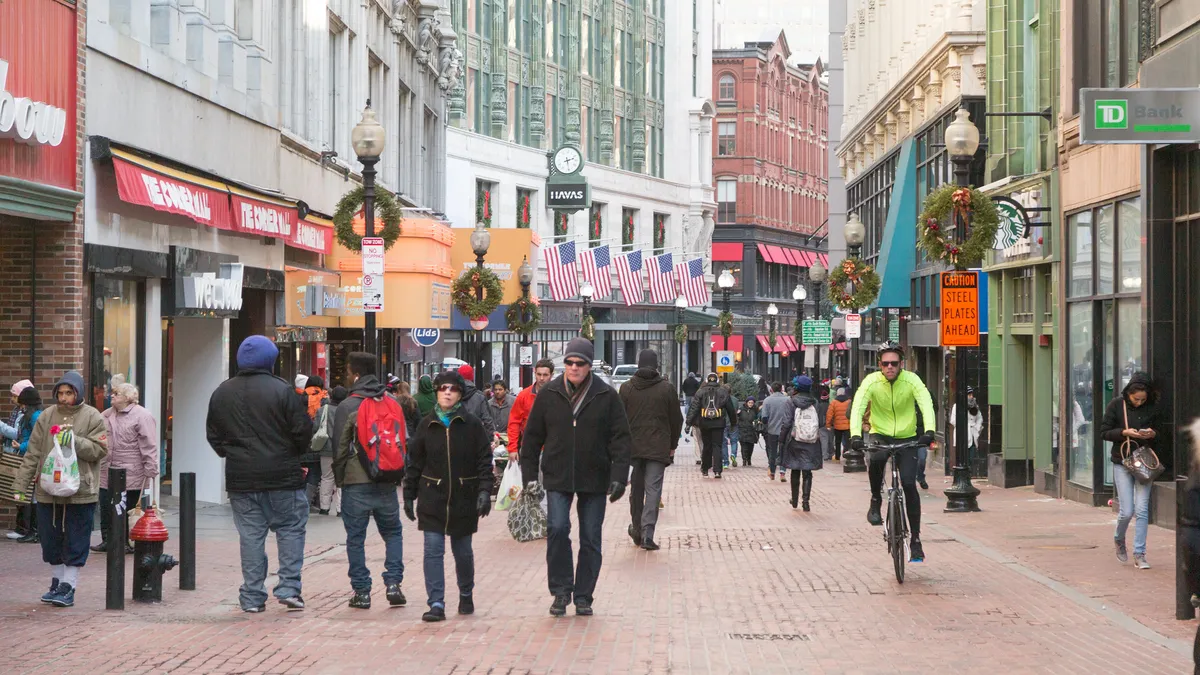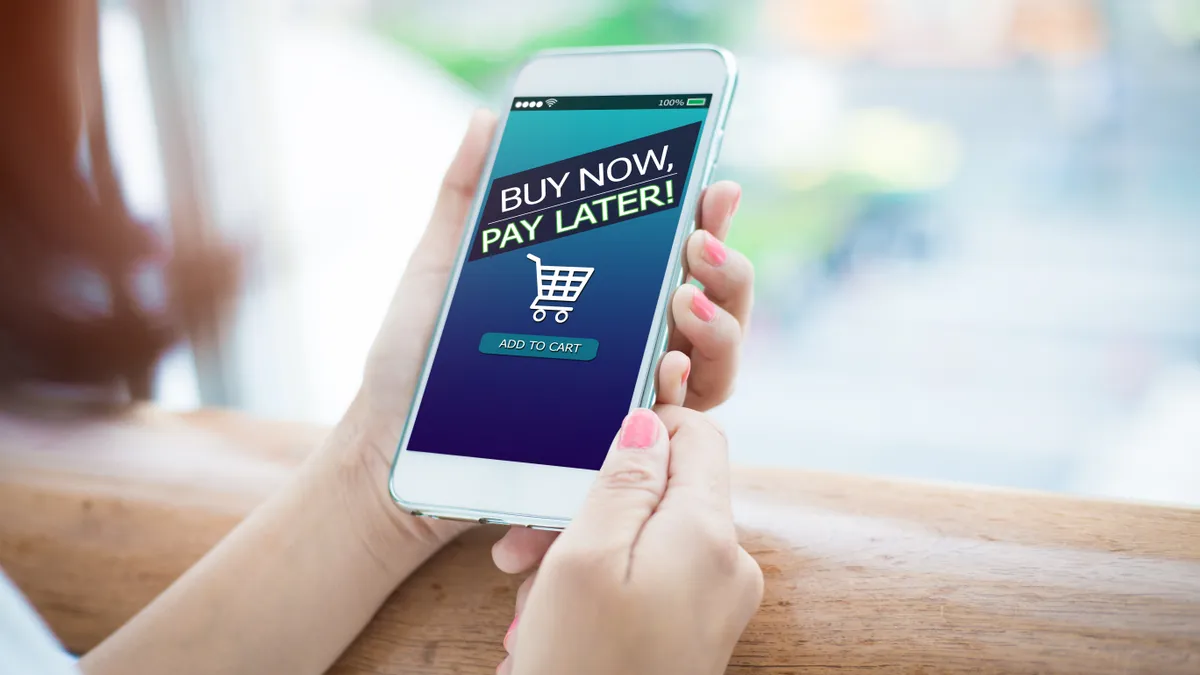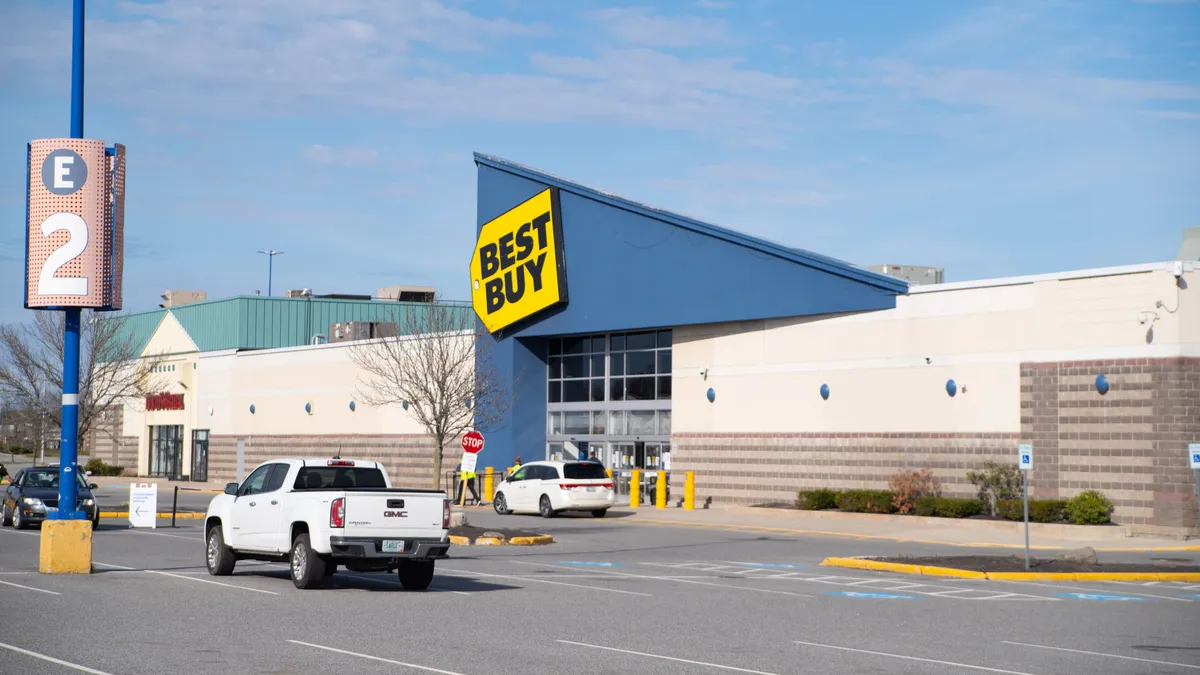Erik's Bike Shop already offered buy online, pick up in-store for several years, a service that was seldom used before the COVID-19 pandemic. Then came the coronavirus.
The outbreak led to more customers using BOPIS as their preferred shopping method, said Erik Saltvold, owner at Erik's Bike Shop, which operates 30 stores in the Midwest and sells cycling, ski and snowboard gear. For Erik's Bike Shop, new BOPIS software has provided useful insights such as where customers are coming from as well as what customers are viewing and buying online, Saltvold said.
Given shifting consumer behavior and regulatory uncertainty regarding brick-and-mortar openings, retailers have offered BOPIS services to help customers and staffers stay safe. With the forthcoming holiday season fast approaching, experts told Retail Dive that now is the time for retailers to refine their BOPIS operations and look to the summer for indicators of what's ahead for this winter.
Building a better BOPIS experience
About a year ago, Erik's Bike Shop began using new software, which had a more robust BOPIS platform than the company's previous provider and allowed the company to execute BOPIS at a higher volume, Saltvold said. As COVID-19 catalyzed a greater demand for BOPIS, the company accelerated its automation for BOPIS processes and retrained employees.
Saltvold wanted the company's digital experience to be seamless, regardless of which touchpoint the customer used to obtain products, "whether they want to buy online, ship to them, buy online, pick up in-store or an in-person brick-and-mortar experience" he said, noting that he wanted it to "meld together."
Equipping a retailer with BOPIS can entail upgrading their order management software, providing mobile devices to sales associates or replacing the point-of-sale system, all of which can be costly, said Holden Bale, vice president of strategy and technology at Huge. But as retailers look for ways to enhance the online shopping experience, analytics will become more critical for retailers, because it will enable them to understand who their customers are, where they're coming in and what content campaigns they respond to, said Robert Brown, managing director at BDO Digital, a Chicago-based accounting, financial advisory and consulting firm.
Retailers will increasingly harness data analytics to understand consumer behavior and tailor their customized holiday campaigns and overall retail experience, Brown said. With the advancements in digital capabilities such as artificial intelligence and natural language processing, consumers could, for example, ask a retailer's app where to find a product in-store, and the app could guide them toward the product, he said.
Beyond integrating the website and in-store functionality, creating a mobile app may require a sinificant ammount of capital upfront, but the cost for retailers to integrate BOPIS into their existing app is negligible, said Arpit Jain, vice president of delivery at Nerdery. Though customers can order items and update existing orders on a retailer's website, mobile apps often have better functionality, Jain said.
One of the ways consumers' expectations have changed over time is how soon they expect BOPIS purchases to be ready for pickup, Bale said. In the past, retailers provided BOPIS purchases within a day or so, but the process has since sped up to prepare shoppers' online orders within hours or less than an hour, he said.
"Obviously, foot traffic is down. But I think one of the things that's changed is [with] so many people working from home and the changing dynamics of time, people are shopping at different times," Bale said. "They have different windows of flexibility and inflexibility."
Given that there are shortages of certain products, the data gleaned from the new software allows customers to find out which location carries the product they are seeking and decide whether they want to pick up from a store further away, Saltvold said. From a logistics perspective, a challenge the retailer has had to navigate is providing a streamlined customer experience through BOPIS, meaning that both customers and staffers can know when customers have placed an order and can expect to pick up their products in-store.
Department stores have struggled during the pandemic and did not invest in their technological infrastructure prior to the coronavirus pandemic, said Natalie Kotlyar, national leader of BDO's Retail and Consumer Products Practice. Right now, their focus is on surviving, and they're likely to have the most problems with pivoting to BOPIS, she said.
Stocking up for the winter
Experts agree that it's hard to predict what the retail environment will look like this holiday season. However, the trends from Easter, Mother's Day and the summer holidays can show retailers how consumers' shopping patterns changed and how their purchases have varied by product category, said Cheryl Policastro, managing director and head of strategy and insights at TPN.
"[I]t'll be really important to have that holiday shopping experience deliver on that need to get in and out."

Cheryl Policastro
Managing Director and Head of Strategy and Insights at TPN
According to a TPN survey published in June, 60% of customers who used BOPIS did so to steer clear of long lines and crowds, and 52% said they used the offering to cut down the time they spent in stores. Before the coronavirus, half of BOPIS shoppers said they used the service to avoid shipping costs, and 21% said it saved them time.
With the holidays ahead, retailers "will need to continue to provide a safe in-store environment that also allows for the browsing that shoppers miss," Policastro said. "A lot of shoppers still feel the need to come and get in and out of the store a little bit more quickly than they used to due to those safety factors, so it'll be really important to have that holiday shopping experience deliver on that need to get in and out."
Compared to last year's holiday season, consumers may be more conservative in their spending even if they have a job, Jain said. But regardless of how much consumers spend, they'll likely be preoccupied with their own concerns and are more likely to be more displeased with any shopping hiccups, Jain said.
"How do you keep [the shopping experience] clean and easy? How do you keep it delightful for your customers?" Jain said. "Customers will remember that. They'll remember how this brand treated me during the difficult times, and that's one way to build loyalty."
Harnessing consumer shopping data can guide retailers toward what to stock for the upcoming holiday season based on their analytics rather than guessing what they might buy, Brown said. Much like grocery stores have to do with perishable items, retailers should also review their inventory cycles more frequently to understand how well their software's inventory assessment is keeping track of what's in stock and plan their online sales accordingly, Bale said.
"This back-to-school and holiday season more so than ever, retailers really need to know and understand their customer base, their wants, and desires and how to stay relevant," Kotlyar said. "The supply chain is going to be difficult in the second half of the year, so understanding your customer and how to stock properly—hopefully with items that sell—is going to be critical."
Per TPN's June survey, 35% of consumers who used BOPIS before the pandemic said the service gave them a sense of control and helped them guarantee items they sought would be in stock. But during the pandemic, 47% of BOPIS users are concerned that their items won't be available for pickup, thus making them feel less in control, the survey found.
Retailers could use their data to notify customers of limited product availability, restrictions on items they can purchase and give customers advance notice on stocked inventory, Policastro suggested.
"I'm sure that [retailers] don't want to do anything to inspire hoarding again, but I think there's probably a way to use their data to give shoppers that sense of control that they appreciated in the past," Policastro said.
Looking ahead to the holidays, Erik's Bike Shop expects customers to seek out skiing and snowboarding products. The retailer will continue fine-tuning its BOPIS process beyond the holiday season, because the pandemic has likely changed consumer shopping behaviors for the long term, Saltvold said.
"I think that habit isn't going to change even post-COVID," Saltvold said. "This will still be one of the primary ways people will buy."


